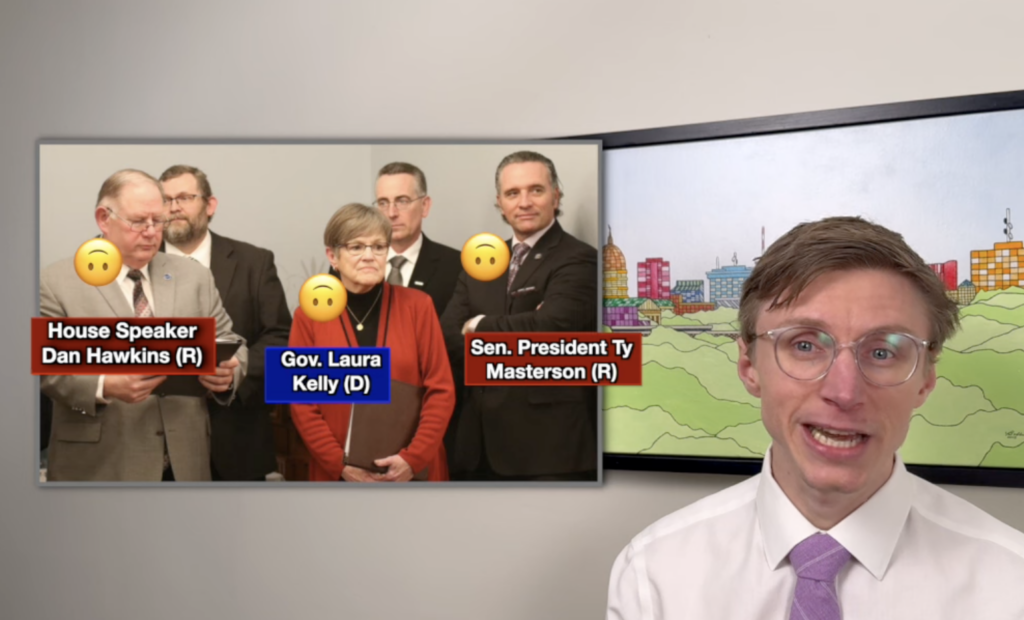Reservation for 650,000: Kansas City’s hospitality industry braces for World Cup workforce scramble
With more than 6,000 open food service job listings and no coordinated plan to address staffing, Kansas City restaurant leaders worry they won’t be ready for the massive influx of World Cup visitors in 2026.

Soccer fans react to the official FIFA World Cup host city announcement on Thursday, June 16, 2022, at the Kansas City Power and Light District in Kansas City. (Zachary Linhares/The Beacon)
[Editor’s note: For another story related to similar concerns about the upcoming World Cup and KC’s preparedness, read Joe Ellett’s reporting on local dispensaries and cannabis business—and the pitfalls waiting for Missouri in the current political climate.]
It’s a good idea to make dinner reservations for parties of more than six people. It allows the restaurant to be staffed and prepared for larger-than-usual groups.
Well, FIFA has made a reservation for up to 650,000 visitors to Kansas City for the six World Cup matches played at Arrowhead Stadium in 2026.
Takeaways
- Kansas City may not have enough current hospitality workers to accommodate the 650,000 World Cup visitors with more than 6,000 open food service job listings and no coordinated plan to address staffing.
- The World Cup presents an economic opportunity to pull vulnerable residents out of poverty and into a hospitality career through workforce training.
- Kansas City’s reputation is at stake as poor hospitality experiences could damage the city’s chances for hosting future major international events.
As ticket sales begin — including four group-stage matches, one round of 32 match and one quarterfinal match hosted in KC — some restaurant leaders are nervous that the area’s hospitality industry isn’t ready for the flood of guests that the World Cup will bring.
“I fear for Kansas City a year from now,” said Jenn Tosatto, beverage director for Penny’s Restaurant Group. “We’ve worked really hard to show that we aren’t just a flyover city and that we have things to offer in our food and beverage scene. But we’re not at our strongest right now.”
Chef Shanita McAfee-Bryant, founder of The Prospect KC, a hospitality workforce development nonprofit, also is worried. She points to the job listing site Indeed, which currently shows more than 6,000 food service job openings, as a cause for concern.
“We have a shortage of 6,000 jobs,” said McAfee-Bryant with the first World Cup match less than a year away. “So how prepared do you think that is? Not prepared at all.”
According to the Mid-America Regional Council, the area’s food service industry employment never fully recovered from COVID. The area is still roughly 1,100 jobs short of the pre-pandemic employment level. Bureau of Labor Statistics data also shows that the larger hospitality and leisure sector in the KC area has shed thousands of jobs each month this year when compared to 2024.
McAfee-Bryant said those numbers mean that if the World Cup started today, Kansas City would be caught short-staffed.
“I know that the city is going to see a surge in demand for hospitality talent,” said McAfee-Bryant. “So what’s the plan to make sure that Kansas Citians reap the benefit of that surge?”
Despite regional cooperation to address transportation, infrastructure, public safety and small-business readiness ahead of the World Cup, there’s currently no formal citywide or regional plan to address a potential boom in demand for hospitality workers.
“I really worry that we’re not going to put our best face forward when the entire world is watching, and that’s scary,” Tosatto said.
Scale of the World Cup challenge
The World Cup dwarfs every major event Kansas City has hosted.
The 2026 World Cup is expected to be the largest sporting event in history with an expanded field of 48 countries playing 104 matches in 16 host cities sprinkled across North America. Each match captures Super Bowl-level television ratings worldwide.
The White House said that each of the 16 host cities will see an influx of at least 450,000 visitors and a net potential economic impact of $480 million on average.
A spokesman for KC2026, the regional nonprofit group in charge of area World Cup preparations, said that 650,000 visitors are expected across Kansas and Missouri with a projected economic impact of $650 million.
For comparison, the Big 12 Basketball Tournament brings roughly 100,000 ticketholders to downtown for two weeks and generates $23 million to $33.5 million annually.
Using KC2026’s figures, hosting the World Cup is like having nearly seven Big 12 tournaments at once — and it lasts nearly three times as long.
The closest example in Kansas City is the 2023 NFL Draft, which brought an estimated 302,000 visitors to a concentrated area of the city over three days. The World Cup matches are expected to bring more than twice that amount to the region over the tournament’s 39 days.
Learning from the past
The 2023 NFL Draft was viewed by some in the local restaurant scene as a dud that failed to live up to expectations for their businesses. Some fear that restaurant owners will hear the World Cup hype and dismiss it, anticipating a repeat of the draft experience.
“We were very — very times a thousand — very, disappointed in our city and how the draft was communicated and marketed to our restaurants,” said Trey Meyers, director of marketing and communications with the Missouri Restaurant Association. “They were lied to, and we were very upset, disappointed, and we raised hell about that.”
He said that restaurants and vendors within the draft’s enclosed physical perimeters and immediate surrounding area saw a substantial boost in sales, but that not all the restaurants in the area saw the increased business that they were promised.
“We’re not going to have that same problem with the World Cup,” said Meyers.
Meyers said his trade group, which represents 12,000 restaurants in the region, has been in communication with City Council members, tourism bureaus and the sports commission.
A KC2026 spokesman referred questions around hospitality readiness to the Greater Kansas City Chapter of the Missouri Restaurant Association and Meyers.
A spokesman for Kansas City, Missouri, did not respond for comment.
Rising unemployment could lead to more food service workers
Meyers said a softening labor market may help resolve the staffing issue heading into the World Cup. He has observed staff reductions and an abundance of applications. Anecdotally, he said that one recently opened restaurant in Olathe, Kansas, saw 92 applications for their staff positions.
“I’d say we aren’t in a hospitality worker shortage,” Meyers said. “I’d say quite the opposite.”
He doesn’t dispute the government statistics or Indeed numbers but offers a different perspective. He said that due to high staff turnover rates in the industry, many employers don’t remove job listings because they are always looking for workers. He also said that the restaurant industry may never fully recover from pandemic job losses. He blames recent staff layoffs on a litany of issues including crime, inflation, third-party delivery charges and other increased operating costs.
“We’ve been having a massive staff overage because of all the layoffs from other industries,” Meyers said. “Everyone defaults to the hospitality industry just to make ends meet and we’ve always seen ourselves as an industry of opportunity.”
The job market here and across the country is beginning to soften. The Kansas City area unemployment rate, which was just 2.5% in May 2022, crept up to 4% in July 2025. In the same month, the number of job seekers outnumbered job listings nationwide for the first time since April 2021.
Restaurateurs who are worried about the World Cup staffing are fretting about the quality, not just the quantity of workers.
“I am getting a huge percentage of applications coming in from people who have never worked in the industry before at all,” Tosatto said. “We don’t just need to get a body in the building, we need someone with skills, ready to go, that can come in and get going. Those people just really aren’t out there right now.”
Demand for workers will rise no matter what
Regardless of whether area restaurants are over- or understaffed today, demand for service industry workers will increase ahead of the World Cup.
Missouri passed legislation allowing businesses to serve alcohol nearly 24/7 during the tournament. Extended hours mean extended staffing needs. Further, Kansas City’s population is 506,032, meaning that if projections are correct, more than a second city full of visitors will swarm the area for more than a month.
Meyers said the exact number of visitors can’t really be estimated until we figure out who’s coming to town when the World Cup draws matchups at random in December.
“It really depends on who’s coming here and who we are catering to,” said Meyers. “If we land a group of major soccer nations like England, Brazil, France and the Netherlands, we’re probably looking at close to a million people here over the 40 days.”
Opportunity meets economic mobility
McAfee-Bryant said the situation may seem intimidating but it also presents an opportunity. She sees the World Cup as Kansas City’s chance to lift vulnerable residents out of poverty permanently.
“This is an opportunity for Kansas City to intentionally build a more diverse hospitality workforce,” she said. “There’s a lot of people who could really use this uptick in commerce and additional funds in their pocket to get on the path towards economic mobility.”
Her organization, The Prospect KC, runs a 16-week training program combining food service skills with wraparound support services to bring people in the urban core out of chronic poverty and into a more stable hospitality career. The nonprofit operates a community kitchen at 750 The Paseo and a coffee shop in Kansas City’s Central Library that offer on-the-job training.
McAfee-Bryant wants to see community-based recruitment in neighborhoods with high unemployment, taking opportunities directly to residents most affected by unemployment and poverty.
“The city has used the World Cup to attract funding for a lot of other things in the city,” said McAfee-Bryant. “So why can’t we use the same World Cup to attract funding and support to help the city strengthen its workforce development pipeline?”
McAfee-Bryant said her organization has limited space and could only train 100 people at a time. She envisions a group of nonprofits, governments, hotels, restaurants, large employers and hiring managers that come together to coordinate a plan to get at least 1,000 workers trained, ready and secure in a new career.
“It’s not something that one organization could take on all alone,” she said. “Everyone is going to have to come to the table to figure it out.”
While larger hotel and restaurant chains can bring in workers from other cities, McAfee-Bryant and Tosatto would like to see local long-term skilled hospitality workers come out of the World Cup.
Mike Burris, the Greater Kansas City Restaurant Association’s executive director, tends to agree. He acknowledges World Cup staffing concerns but emphasizes quality over quantity of hospitality jobs going forward.
“I want to make sure that when we put people into the industry that we’re not looking for temporary help, but we’re looking for long-term help,” said Burris. “That’s always been an issue in the restaurant business.”
KC’s reputation at stake
Boosters say the World Cup represents Kansas City’s chance to cement its status as a destination for more international events. The city has invested heavily in preparations like infrastructure and logistics.
But McAfee-Bryant said if the area doesn’t address the supply of hospitality workers, the World Cup in Kansas City will be like a beautiful wedding that has slow service and gross food.
“Poor hospitality is the thing that will ruin this experience for everybody,” McAfee-Bryant said.
The clock is ticking. Kansas City has less than a year to prepare for the biggest food service industry challenge in its history. The reservation for 650,000 is confirmed.
The world will be watching next summer. Visitors to the area will talk about their experience for years. Their reviews could influence Kansas City’s reputation — and its future as a host city — for decades to come.
“What do you think all the people are going to talk about?” McAfee-Bryant asks.
This article first appeared on Beacon: Kansas City and is republished here under a Creative Commons Attribution-NoDerivatives 4.0 International License.![]()




